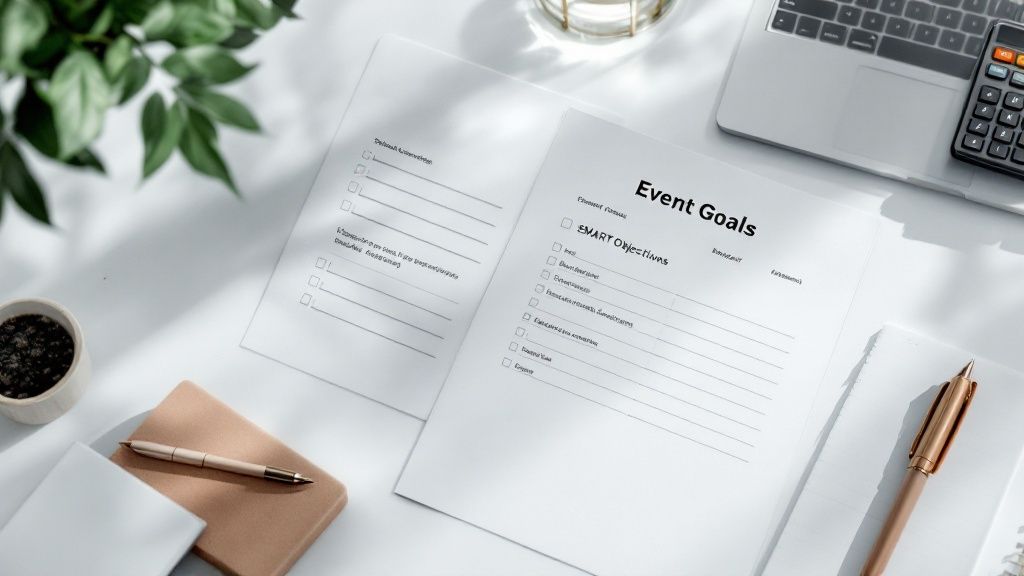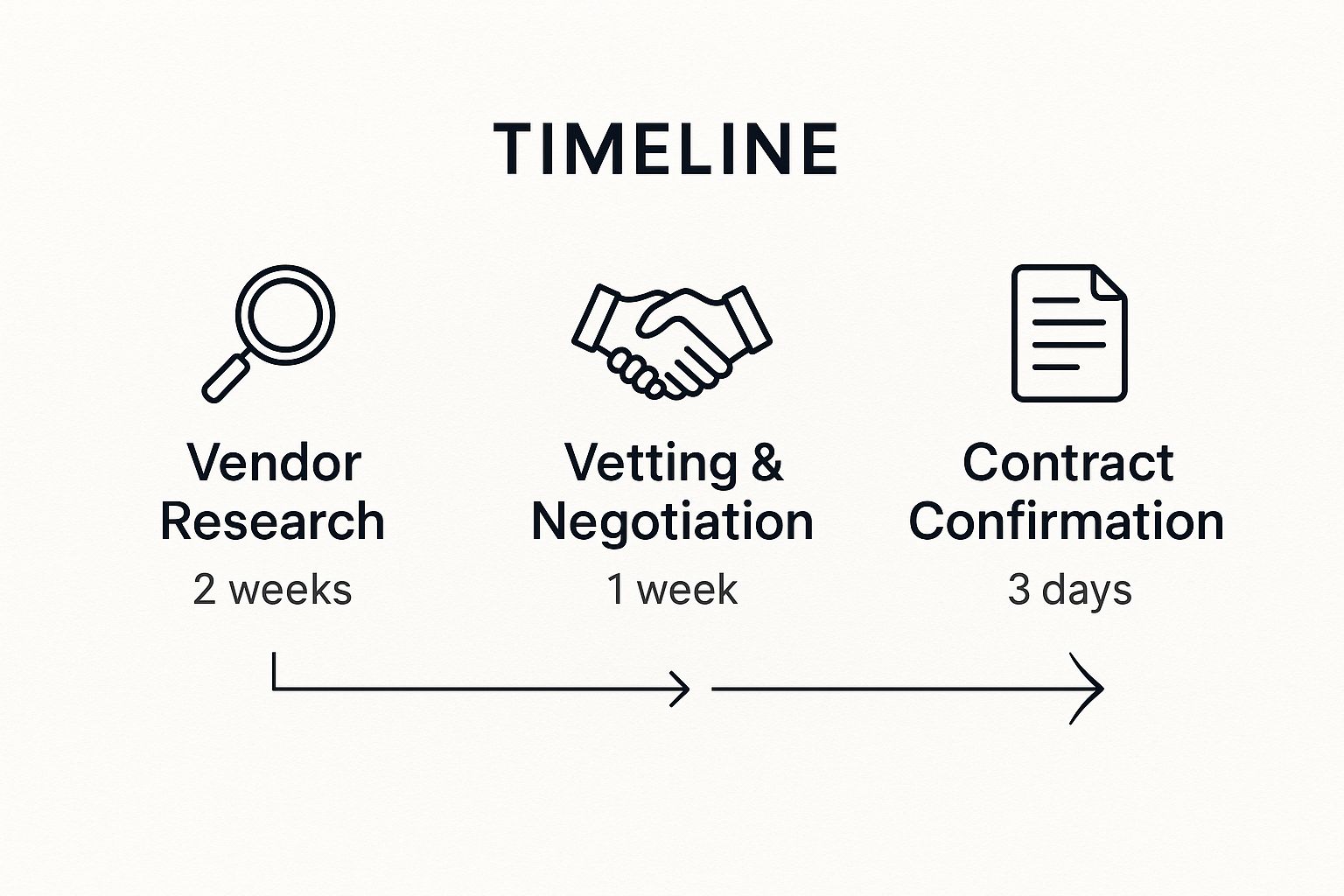Getting Started with Your Event Planning
Planning any event, from a small party to a large corporate gathering, can be stressful. This event planning checklist provides a clear roadmap to navigate every step of the process. Whether you're managing a wedding, coordinating a charity gala, or organizing a corporate event, this list covers crucial aspects like setting a budget, finding the perfect venue, coordinating vendors (like that awesome photo booth you've been eyeing!), managing guests, and promoting your event. Following this 2025 event planning checklist ensures a smooth, successful, and stress-free event.
1. Establishing Event Goals and Budget
Kicking off any successful event, whether it's a dream wedding, a corporate conference, a birthday bash, a charity gala, or a cutting-edge art exhibition, starts with a solid foundation: establishing clear goals and a realistic budget. This isn't just about throwing numbers and ideas around; it's the bedrock of your event planning checklist, setting the stage for everything that follows. It's about figuring out what you want to achieve and how much you're willing to spend to make it happen. This crucial first step prevents your event from spiraling into a chaotic mess of overspending and unmet expectations.

This process involves defining your objectives. What's the purpose of your event? What do you want attendees to take away? For a wedding, it might be creating a memorable celebration of love. For a corporate event, it might be generating leads or boosting brand awareness. For a private party, it might simply be having fun! Once you've nailed down the "why," you can move on to the "how much." Creating a comprehensive budget means allocating resources across various categories, from venue rental and catering to marketing and entertainment (yes, even that awesome photo booth!).
Think of events like TED, Salesforce's Dreamforce, or SXSW. Their success hinges on meticulous goal-setting and budget allocation. TED focuses on speaker quality and audience experience, Dreamforce breaks down their budget by attendee touchpoints, and SXSW utilizes a multi-year budget plan. These examples demonstrate how powerful a well-defined roadmap can be.
Want some actionable tips? Use the SMART framework (Specific, Measurable, Achievable, Relevant, Time-bound) to define your objectives. A vague goal like "have a great party" won't cut it. Instead, try something like "Increase brand awareness by 15% through social media engagement during the product launch event." When building your budget, Learn more about Establishing Event Goals and Budget and be sure to categorize expenses (venue, catering, marketing, etc.), include a contingency fund (15-20% is a good starting point), document all assumptions, and get written approval from all stakeholders.
Features of this crucial step include:
- Goal-setting framework: Provides a structure for defining objectives.
- Budget development spreadsheet: Helps track and manage expenses.
- ROI calculation metrics: Allows for measuring event success.
- Stakeholder alignment process: Ensures everyone is on the same page.
Pros:
- Provides clear direction for all subsequent planning activities.
- Prevents scope creep and unnecessary expenses.
- Creates accountability metrics for evaluating success.
- Helps secure appropriate funding.
Cons:
- Quantifying some event objectives (like "creating a memorable experience") can be challenging.
- Requires regular revision as planning progresses and new information emerges.
- Initial budget estimates often need adjustment as vendors are secured and details are finalized.
This approach is essential for anyone planning any type of event. It deserves the top spot on the checklist because it lays the groundwork for everything else. Experts like the Event Management Institute (EMI), Meeting Professionals International (MPI), and Julius Solaris (Event MB founder) all emphasize the importance of this initial stage. So, take the time to define your goals, build a realistic budget, and watch your event vision come to life, stress-free and within budget!
2. Venue Selection and Management
Picking the right spot for your event is like choosing the right foundation for a house – it’s crucial! Venue selection and management is a key item on any event planning checklist, affecting everything from attendee experience to budget management. This involves researching potential locations, visiting them, hammering out contracts, understanding their technical capabilities (like Wi-Fi and sound systems), ensuring accessibility for all guests, and staying in close contact with the venue staff from planning all the way through the actual event. This might sound like a lot, but breaking it down makes it manageable and ensures a smooth event.

Think of companies like Apple, known for their meticulously planned product launches at the Steve Jobs Theater, a venue designed specifically for their needs. Or Google I/O, which leverages the flexibility of Shoreline Amphitheatre. Even Comic-Con’s long-term relationship with the San Diego Convention Center demonstrates the power of a well-chosen and managed venue. These examples, from tech giants to pop culture phenomena, show how venue selection impacts event success.
This process deserves a top spot on your event planning checklist because it influences so many other aspects of your event. Features like location analysis frameworks, capacity planning tools, venue comparison matrices, contract negotiation checklists, and AV/technical requirements evaluations can help you make informed decisions. Getting the venue right can significantly boost attendee satisfaction. Booking early often snags you better rates and your preferred dates. The right venue can even cut down on extra rental costs, and experienced venue staff can be a goldmine of helpful planning advice.
However, there are downsides to consider. Popular venues often book up way in advance (think 12-18 months!), so planning ahead is essential. Hidden fees can sneak up on you and blow your budget, so read those contracts carefully! Venue restrictions might limit your design and catering choices, and if you're planning an outdoor event, you absolutely must have a weather contingency plan.
Here are some actionable tips to nail your venue selection:
- Create a detailed RFP (Request for Proposal) for venues: This helps you clearly communicate your needs and compare apples to apples.
- Visit venues at the same time of day as your planned event: This gives you a realistic sense of lighting, noise levels, and overall atmosphere.
- Check noise restrictions and end-time policies: Avoid those awkward early shutdowns!
- Understand power and internet capabilities thoroughly: Especially important for tech-heavy events or if you're planning to have a photo booth.
- Negotiate attrition clauses carefully: These clauses determine what happens if your guest count changes.
- Request a detailed floor plan with measurements: Essential for planning layouts and ensuring everything fits.
- Confirm insurance requirements early: Don't get caught off guard by last-minute insurance needs.
Whether you're planning a wedding, a corporate event, a private party, a charity fundraiser, or any other type of event, choosing the right venue is paramount. Learn more about Venue Selection and Management for smaller event spaces. Resources like Cvent’s venue marketplace, tips from celebrity event planners like Colin Cowie, and The Knot's venue selection tools are great places to start your research.
3. Vendor Selection and Coordination
Vendor selection and coordination is a crucial part of any successful event planning checklist. This task involves finding, vetting, hiring, and managing all the outside service providers you'll need to bring your event to life. Think caterers, audiovisual teams, decorators, photographers, entertainment, security, transportation, and any other specialized services your event might require. Getting this right can make or break your event, so careful planning is essential.

This infographic visualizes the vendor selection and coordination timeline, outlining key milestones from initial research to post-event follow-up.
From initial brainstorming to the final thank you notes, managing vendors is a multi-stage process. The infographic highlights the chronological flow of vendor management, starting with identifying needs and researching vendors. It then moves through requesting proposals, comparing bids, negotiating contracts, scheduling regular check-ins, and finally, conducting post-event evaluations. This timeline emphasizes the importance of early planning and ongoing communication throughout the entire event planning process.
So, why is this so important for your event planning checklist? Well, top-notch vendors can significantly elevate the guest experience. They bring expertise and professionalism that you might not have in-house. Plus, building long-term relationships with vendors can often lead to preferred pricing and access to their valuable network for backup options in case of emergencies. Imagine your DJ cancels last minute – having a backup contact ready to go can save the day!
Features like a structured vendor qualification process, service level agreement templates, a vendor coordination timeline, clear communication protocols, and performance evaluation metrics can streamline the entire process. These tools can help you stay organized and ensure everyone is on the same page.
However, vendor coordination does have its challenges. It can be time-consuming, and highly sought-after vendors might have limited availability, especially during peak seasons. Managing multiple vendors adds complexity, and a vendor failing to deliver can severely impact your event's success. That's why thorough planning and proactive communication are key.
Think about events like Coachella, known for its complex multi-vendor orchestration, or the Met Gala's perfectly synchronized vendor timeline. Even SXSW uses a sophisticated vendor management portal for its hundreds of service providers. These examples highlight the importance of a well-oiled vendor management system for large-scale events.
Here are some practical tips to make vendor selection and coordination smoother:
- Get References: Always request and contact at least three references for each vendor.
- Centralized Contact Sheet: Create a central contact sheet with all vendor details and emergency numbers.
- Regular Check-ins: Schedule regular check-in meetings with your vendors to discuss progress and address any concerns.
- Clear Contracts: Clearly define deliverables, deadlines, and payment terms in your contracts.
- Insurance: Request certificates of insurance from all vendors to protect yourself from liability.
- Backup Plans: Build relationships with backup vendors for critical services like catering and entertainment.
- Logistics: Create detailed load-in and load-out schedules to avoid conflicts and ensure smooth transitions.
Whether you're planning a wedding, a corporate event, a private party, or a charity fundraiser, effective vendor management is essential. Following these tips and utilizing the resources available, like the BizBash vendor marketplace or connecting with professionals through the International Live Events Association (ILEA), can help you navigate this critical aspect of event planning. Just remember, investing time and effort in vendor selection and coordination will pay off in a big way when you see your event come together seamlessly.
4. Event Timeline and Production Schedule Creation
Creating a killer event isn't about magically pulling things together on the day. It's about meticulous planning and precise execution, which is where your event timeline and production schedule come in. This crucial part of your event planning checklist ensures you don't miss a beat, from the initial brainstorming session all the way to the post-event wrap-up. Think of it as your event's roadmap – it guides everyone involved and keeps things running smoothly.
Essentially, you're mapping out everything – every single task, big or small. This includes setting deadlines, assigning responsibilities, and creating a detailed day-of schedule. Imagine the Super Bowl halftime show – that flawlessly executed 7-minute spectacle requires a military-precision setup timeline. Or picture the Olympics opening ceremony; its success hinges on a multi-team synchronized production schedule. Even on a smaller scale, this kind of planning is essential.
Here's what a robust timeline and production schedule entails:
- Master Planning Timeline: The bird's-eye view of your entire planning process, from initial concept to post-event evaluation.
- Minute-by-Minute Run of Show: The detailed, granular schedule for the event day itself, outlining what happens when, down to the minute.
- Staff/Volunteer Schedules: Who's doing what, and when? This ensures everyone knows their roles and responsibilities.
- Critical Path Management: Identifying the most crucial tasks that directly impact the event's success and managing them closely.
- Dependency Mapping: Understanding which tasks rely on others being completed first, ensuring a logical workflow.
Why is this so important for your event? Well, imagine trying to coordinate caterers, decorators, entertainers, and a hundred other moving parts without a clear plan. Chaos, right? A solid timeline:
- Provides clear structure and prevents missed deadlines: No more last-minute scrambles!
- Helps identify potential scheduling conflicts early: Imagine realizing your venue is double-booked a week before the event – a timeline helps avoid such nightmares.
- Creates accountability through task assignment: Everyone knows what they're responsible for, fostering a sense of ownership.
- Ensures proper resource allocation throughout the planning process: You'll know what resources you need and when, optimizing efficiency.
Of course, like any planning tool, timelines and production schedules have potential drawbacks:
- Requires constant updating as plans evolve: Be prepared to adapt and refine your timeline as your event takes shape.
- Can become overly detailed and difficult to manage: Find the right balance between detail and manageability.
- Often needs adjustment during event execution: Things don't always go exactly as planned, so flexibility is key.
- Dependent on accurate time estimates which can be challenging: Be realistic and build in buffer time.
Actionable Tips for Success:
- Work backward from the event date: This helps prioritize tasks and set realistic deadlines.
- Build in buffer time for critical path activities: Things will go wrong, so padding your timeline is crucial.
- Create separate timelines for different teams: This simplifies things for everyone involved. Think catering, setup, entertainment, etc.
- Include contact information with each assigned task: Easy communication is key.
- Schedule regular timeline review meetings: Keep everyone on the same page and address any issues proactively.
- Use cloud-based project management tools: Real-time updates and collaboration made easy.
- Create condensed versions for key stakeholders: Not everyone needs to see the minute-by-minute breakdown.
Whether you're a couple planning a wedding, a corporate event manager, or organizing a charity gala, a solid timeline and production schedule is your secret weapon. From renowned production management consultants like Tom Bercu Consulting to the industry standards set by the Project Management Institute (PMI) and the Technical Direction Company, the importance of structured scheduling is undeniable. Learn more about Event Timeline and Production Schedule Creation to delve deeper into this crucial aspect of event planning. This is why it deserves a prominent place on your event planning checklist, right alongside venue booking and vendor selection.
5. Guest List Management and Registration
No matter what type of event you're planning—from a small birthday bash to a large corporate conference—managing your guest list and registration process is crucial for a smooth and successful event. This involves everything from creating your initial list and collecting RSVPs to managing ticket sales and designing the on-site check-in procedure. This part of event planning ensures you have an accurate headcount for catering, seating arrangements, and other logistical needs, and it helps you create a more personalized experience for your attendees.

Think of guest list management as the central nervous system of your event. It connects all the moving parts, ensuring everyone is where they need to be when they need to be there. This involves leveraging various tools and techniques including dedicated registration platforms (like Eventbrite, Cvent, or Bizzabo), attendee database management, ticketing systems, RSVP tracking tools, and even something as seemingly simple as name badge creation. All these components play a vital role in crafting a seamless attendee journey, from initial invitation to final farewell.
Examples of Successful Implementation:
- Large Scale Events: Dreamforce, a massive tech conference, uses a multi-tiered registration process allowing attendees to personalize their agendas based on their interests. Similarly, SXSW utilizes a sophisticated badge system and queue management to handle the huge influx of attendees. Tomorrowland, a renowned music festival, goes a step further with personalized bracelets that serve as both tickets and a cashless payment method.
- Smaller Scale Events: Even for smaller events like weddings or corporate parties, using a simple online RSVP system or a well-organized spreadsheet can greatly streamline the process.
Why This Deserves a Spot on the Checklist:
Guest list management deserves its place on any event planning checklist because it directly impacts nearly every other aspect of your event. Accurate guest data enables proper capacity planning, personalized communication, targeted marketing efforts, and streamlines the on-site experience. It's the backbone of a well-organized and successful event.
Pros:
- Provides critical data for capacity planning (catering, seating, etc.)
- Enables personalized attendee experiences (e.g., customized agendas, dietary restrictions)
- Creates opportunities for pre-event engagement (e.g., surveys, polls)
- Streamlines on-site check-in processes, reducing wait times
Cons:
- Managing late registrations and cancellations can be challenging.
- Complex registration forms can deter completion.
- Registration platforms can be costly for large events.
- Data privacy regulations require careful compliance.
Actionable Tips for Effective Guest List Management:
- Keep it Simple: Registration forms should be as concise as possible while collecting essential information.
- Mobile-Friendly: Ensure your registration process is optimized for mobile devices.
- Confirmations: Send confirmation emails with clear event details and directions.
- Early Bird Incentives: Create registration deadlines and incentivize early registration.
- Contingency Plan: Have a plan for on-site registration and last-minute changes.
- Test Your System: Thoroughly test your check-in process before the event day.
- Train Your Staff: Ensure staff are trained on handling registration exceptions and troubleshooting.
By prioritizing guest list management and registration, you’re setting the stage for a seamless, enjoyable, and well-attended event, regardless of its size or purpose.
6. Marketing and Promotion Strategy
No matter how awesome your event is, it won't be a success if nobody knows about it! That's where a killer marketing and promotion strategy comes in. This crucial step in your event planning checklist helps you build buzz, attract your target audience, and ultimately, fill those seats (or virtual rooms!). Think of it as the loudspeaker for your amazing event.
This involves a lot more than just sending out a few emails. We're talking about crafting a comprehensive plan that encompasses everything from identifying your ideal attendee (corporate event managers, wedding planners, party hosts – whoever you're trying to reach!) to analyzing which marketing channels will best reach them. It also means carefully curating content that speaks directly to their needs and interests. Are you planning a wedding? Your marketing should speak to couples. Hosting a corporate gala? Target your industry professionals. Throwing a private party? Focus on creating excitement within your friend group.
A well-defined marketing and promotion strategy boasts several key features:
- Target Audience Analysis: Who are you trying to attract? Understanding their demographics, interests, and online behavior is crucial for tailoring your message.
- Multichannel Marketing Planning: Think beyond just one platform. This includes social media, email, your event website, potentially even print advertising or partnerships.
- Content Creation Workflow: Planning and creating engaging content (think blog posts, videos, social media updates) is key for building pre-event excitement.
- Social Media Strategy: Leveraging platforms like Instagram, Facebook, and Twitter to reach your audience where they already hang out.
- Email Marketing Sequences: Targeted emails to specific segments of your audience to keep them informed and engaged.
- PR and Media Relations: Reaching out to relevant media outlets to get the word out about your event.
- Marketing Analytics Tracking: Monitoring your efforts to see what's working and what needs tweaking.
Why This Deserves a Spot on Your Checklist:
Simply put, without effective marketing, your event might not reach its full potential. A strong strategy not only drives registrations but also builds pre-event excitement, establishes your event's brand identity (think Coachella's distinct vibe), and provides valuable data for future events.
Pros:
- Builds awareness and drives registration
- Creates pre-event engagement opportunities
- Helps establish event brand identity
- Provides data for future event planning
Cons:
- Requires significant time and resource investment
- Effectiveness can be difficult to measure precisely
- Oversaturation can lead to audience fatigue
- Needs consistent messaging across multiple channels
Examples of Success:
Think about SXSW’s year-round content strategy that builds anticipation for their main event, or Coachella's masterful lineup release strategy and social media campaign. Even Adobe MAX uses a targeted outreach program to connect with industry professionals. These examples show the power of a well-executed marketing plan.
Actionable Tips:
- Create a distinctive event brand and consistent visual identity: Make it memorable!
- Develop a content calendar with strategic release dates: Plan ahead and keep the content flowing.
- Utilize email marketing for targeted messaging to different segments: Personalized communication is key.
- Leverage speakers and partners in promotional efforts: Expand your reach!
- Create shareable content for amplification: Encourage your audience to spread the word.
- Implement trackable links and registration codes: Measure your success and see what's working.
- Establish a hashtag strategy for social media: Make it easy for people to find and follow your event online.
Learn more about Marketing and Promotion Strategy (While this link focuses on party themes, it highlights the importance of tailored experiences, a crucial aspect of marketing).
Popularized by organizations like the Event Marketing Institute and influenced by thought leaders like Gary Vaynerchuk, a strong marketing strategy is no longer optional. It's the backbone of a successful event, no matter the size or scope. Remember, even a photo booth at your wedding needs promotion to capture those fun moments! So, invest the time and resources. It's worth it.
7. Logistical Planning and Execution
This is where the rubber meets the road in your event planning checklist! Logistical planning and execution is all about the nitty-gritty operational details that make your event actually happen. Think of it as the behind-the-scenes magic that ensures everything runs smoothly, from the moment the first vendor arrives to the last guest's departure. Without a solid logistical plan, even the most creative event concept can fall flat. This is why it's a crucial part of any comprehensive event planning checklist.
So, what does logistical planning entail? It encompasses everything operational:
- Transportation and Parking: How will guests get to your event? Is there adequate parking, or will you need shuttles? What about ride-sharing options?
- Equipment Inventory Management: From tables and chairs to sound systems and lighting, you need to know what you need, where it's coming from, and when it arrives.
- Load-in/Load-out Schedules: Coordinating vendor deliveries and pickups is key to avoiding chaos and ensuring everything is set up and taken down on time. Staggered schedules are your friend!
- Signage and Wayfinding Systems: Help your guests navigate the event space easily with clear signage. No one wants to wander around lost!
- ADA Compliance Verification: Ensure your event is accessible to everyone by adhering to ADA guidelines for venues, restrooms, and other facilities.
- Security and Crowd Management: Depending on the size and nature of your event, security might be a major consideration. How will you manage crowds, especially during peak times?
- Supplier Delivery Coordination: Flowers, catering, rentals – everything needs to arrive on time and in the right place. Clear communication with your suppliers is essential.
Why is this so important? Well-executed logistics remain invisible to your attendees. They simply experience a seamless and enjoyable event. Thorough planning prevents day-of emergencies and ensures everything is accounted for. Think of it as the backbone of your event.
Pros:
- Thorough logistics planning prevents day-of emergencies.
- Proper coordination maximizes setup efficiency.
- Detailed plans ensure nothing is overlooked.
- Well-executed logistics remain invisible to attendees, contributing to a seamless experience.
Cons:
- It's extremely detail-oriented and time-consuming.
- Requires constant adjustment as other elements of the event plan change.
- Often faces unexpected challenges requiring rapid solutions.
- Dependent on multiple external factors and vendors, which can be unpredictable.
Real-World Examples:
- Think about the complex transportation systems needed for the Olympic Games, moving athletes and spectators between venues.
- Consider the temporary infrastructure logistics of Burning Man, a city that appears and disappears in the desert.
- Imagine the orchestrated chaos of CES, with exhibitors moving in and out of multiple venues simultaneously. These large-scale events highlight the crucial role of meticulous logistical planning.
Actionable Tips for Your Event:
- Create detailed floor plans with measurements: This helps visualize the space and plan equipment placement.
- Develop comprehensive equipment lists with backup options: Just in case something goes wrong!
- Schedule staggered delivery times for different vendors: Avoid bottlenecks and ensure smooth setup.
- Create a logistics command center during setup and the event itself: A central hub for communication and problem-solving.
- Conduct a walkthrough rehearsal before the event: Identify potential issues and fine-tune the plan.
- Prepare contingency plans for weather or transportation disruptions: Be ready for anything!
- Use walkie-talkies or staff communication apps for real-time coordination: Keep everyone on the same page.
Industry Leaders:
Companies like Freeman, GES, and Teamwork Event Specialists have popularized and perfected event logistics systems, demonstrating the importance of this aspect of planning.
Whether you're planning a grand wedding, a corporate conference, a small private party, or a large-scale charity gala, don't underestimate the power of logistical planning. It's the glue that holds your event together and ensures a smooth, stress-free experience for both you and your guests. By paying close attention to these details and following these tips, you can transform potential chaos into a well-oiled machine, leaving you free to enjoy the event you worked so hard to create.
8. Post-Event Evaluation and Follow-up
This crucial final step in your event planning checklist is all about assessing what worked, what didn't, and how to make your next event even better. Post-event evaluation and follow-up isn't just about patting yourself on the back (though you deserve that too!), it's about gathering valuable data and insights that can inform future event planning decisions and maximize your return on investment (ROI). This stage solidifies the impact of your event, turning a one-time experience into a stepping stone for continued success. It's an essential part of any comprehensive event planning checklist.
How does it work? It's a multi-faceted process that involves gathering feedback from various sources, analyzing key metrics, and documenting lessons learned. Think of it as a debriefing for your event, allowing you to capitalize on successes and learn from any hiccups.
Features to Consider:
- Attendee Satisfaction Surveys: Gauge how your guests experienced the event.
- Key Performance Indicator (KPI) Analysis: Measure against pre-set goals (e.g., attendance, lead generation).
- ROI Calculation Methodology: Determine the financial return of your event.
- Stakeholder Debrief Meetings: Gather insights from sponsors, vendors, and internal teams.
- Thank-You Communication Plans: Express gratitude to attendees and partners.
- Content Archiving Systems: Preserve valuable event materials for future use.
- Lessons Learned Documentation: Create a repository of insights for future reference.
Pros:
- Demonstrates Event Value: Provides concrete data to showcase the event's success.
- Identifies Areas for Improvement: Highlights areas needing refinement for future events.
- Extends Event Impact: Follow-up content keeps the conversation going.
- Creates Accountability: Ensures event objectives are met and measured.
- Strengthens Relationships: Shows appreciation and fosters ongoing connections.
Cons:
- Often Neglected: Post-event fatigue can lead to this stage being overlooked.
- Low Survey Response Rates: Incentives can encourage participation.
- Qualitative Feedback Can Be Difficult to Quantify: Developing clear analysis methods is key.
- Team Turnover: Ensure debriefings happen promptly before team members move on.
Real-World Examples:
- Salesforce's Dreamforce: Their multi-tier feedback analysis provides comprehensive insights.
- TED: Their content distribution strategy extends the conference's reach far beyond the event itself.
- South by Southwest (SXSW): Their year-over-year improvement tracking system showcases their commitment to continuous improvement.
Actionable Tips:
- Design Surveys Early: Focus on specific goals for your feedback.
- Schedule Prompt Debrief Meetings: Capture insights while the event is fresh in everyone's minds.
- Gather Diverse Feedback: Collect input from attendees, sponsors, staff, and vendors.
- Compare Results Against KPIs: Measure success against pre-determined benchmarks.
- Document Learnings: Create a centralized document to capture key takeaways.
- Personalized Thank-Yous: Show appreciation to key participants.
- Repurpose Content: Develop a plan to maximize the value of event materials.
Once the event is wrapped up, managing the administrative and financial aspects, such as vendor invoices and expense reimbursements, becomes crucial. Streamlining these tasks through digital solutions can be a lifesaver. For a practical guide on transitioning to digital invoicing, check out this resource: transition vers la facturation en ligne. This way, you can efficiently handle post-event finances while focusing on the valuable insights gathered from your evaluation.
Whether you're planning a wedding, a corporate gala, a private party, a charity fundraiser, or a creative industry event, post-event evaluation is a non-negotiable. Learn more about Post-Event Evaluation and Follow-up. It’s a critical component of any effective event planning checklist. By taking the time to analyze and reflect, you're not only celebrating past successes but also setting the stage for even more impactful future events.
Event Planning Strategies Comparison Table
| Task / Strategy | Implementation Complexity 🔄 | Resource Requirements 🔄 | Expected Outcomes 📊 | Ideal Use Cases 💡 | Key Advantages ⭐ |
|---|---|---|---|---|---|
| Establishing Event Goals and Budget | Medium – requires stakeholder input, iterative | Moderate – budget tools, financial data, reviews | Clear direction, budget control, accountability | Any event needing clear financial and objective foundation | Prevents overspending, aligns stakeholders |
| Venue Selection and Management | High – site visits, contract negotiation | High – venue research, legal review, technical checks | Enhanced attendee experience, secured location | Events relying on physical space and facilities | Early booking secures better rates, expert support |
| Vendor Selection and Coordination | High – vetting, multi-party coordination | High – vendor research, contract management | Quality services, backup plans, professional support | Events with multiple external service providers | Enhances event quality, vendor reliability |
| Event Timeline and Production Schedule Creation | Medium – detailed planning, frequent updates | Moderate – scheduling tools, team coordination | Structured workflow, deadline adherence | Complex events needing synchronized multi-team efforts | Prevents missed deadlines, ensures resource allocation |
| Guest List Management and Registration | Medium – database and platform management | Moderate – registration systems, communication tools | Accurate capacity planning, smooth check-in | Events with high attendance and personalized experiences | Streamlines entry, improves attendee engagement |
| Marketing and Promotion Strategy | High – multichannel planning, content creation | High – marketing resources, platforms, analytics | Increased awareness and registrations | Events aiming to build large or targeted audiences | Builds brand, drives engagement |
| Logistical Planning and Execution | Very High – detailed coordination, contingency | High – equipment, transportation, staff | Seamless event flow, minimal day-of issues | Large-scale events requiring complex operation | Prevents emergencies, maximizes efficiency |
| Post-Event Evaluation and Follow-up | Medium – data gathering, analysis, communication | Moderate – survey tools, reporting software | Insights for improvement, stakeholder satisfaction | All events seeking measurable impact and future growth | Demonstrates value, strengthens relationships |
Wrapping Up and Looking Ahead
From setting your event goals and budget to post-event follow-up, this event planning checklist has covered the essential elements for a successful event in 2025. We've touched on everything from venue selection and vendor coordination (like finding the perfect photo booth!) to crafting a killer marketing strategy and managing those all-important logistics. Mastering these steps, whether you're planning a wedding, corporate event, private party, or charity gala, is the key to minimizing stress and maximizing impact. Remember, a well-structured event planning checklist keeps you organized, on track, and ready to handle any curveballs. This allows you to focus on what truly matters: creating a memorable and engaging experience for everyone involved.
By implementing this checklist, you’re not just planning an event; you’re building a foundation for future success. Each event you organize, using these principles, becomes a stepping stone to even bigger and better things. With meticulous planning and careful execution, your event will be one for the books.
Ready to take your event to the next level? Let 1021 Events help you bring your vision to life! We specialize in handling the details so you can enjoy the experience. Visit 1021 Events today to discover how our expertise can elevate your next event.




